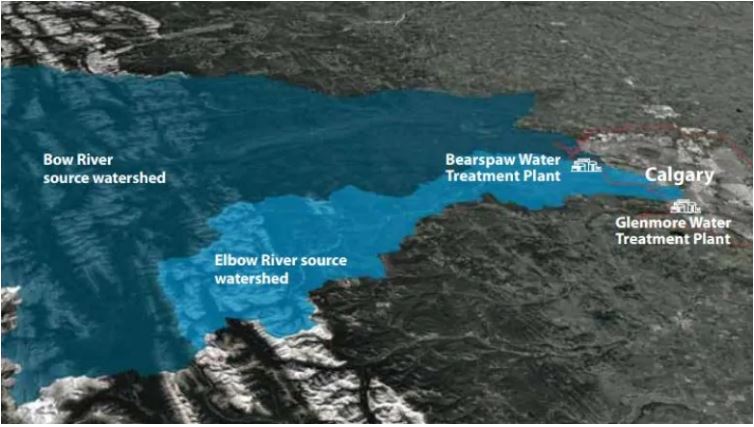In the framework of the 10th World Water Forum (WWF), the Ministry of Public Works and Housing (PUPR) and the Jakarta Foreign Correspondents Club (JFCC) jointly organized a panel discussion titled "Road to the 10th World Water Forum: Policy, Technology, and Investment Opportunity in Water Resources Management" on (04/07). During his opening speech, Special Advisor to the Minister of Public Works and Housing of the Republic of Indonesia on Technology, Industry & the Environment Endra Saleh Atmawidjaja said, "It is an honor for Indonesia to host the 10th World Water Forum and to be a leader in assessing global water issues. We aim to promote peace, independence and prosperity in terms of the availability of water resources."
Canada and the Yukon sign agreement in principle to deepen collaboration on planting 2 billion trees nationally
Canada and the Yukon are collaborating to fight climate change, protect nature and important habitats, fight biodiversity loss, improve air and water quality and preserve our natural heritage for future generations. Last month during COP15, Minister Wilkinson announced the launch of the third call for proposals of this program, ensuring additional long-term agreements with eligible partners, including Indigenous communities and partners, municipalities and for- and non-profit organizations, as we continue to advance our commitment to support partners in planting two billion trees by 2031.
‘Bone dry or soaking wet,’ water study faces extremes
Farmers learned a lot from the real-world whiplashing experiment you could call “Farming in 2021-22.” “Make sure your dugouts are deep enough,” said Ridgeville, Man., farmer Neil Claringbould, when asked what he learned from the brutal drought of 2021, as he showed other farmers and researchers one of his new water retention dams on a stream on his land. How about 2022? “We weren’t short of grass.”
USask major scientific centres awarded $170M of MSI funding
$15.25 million is for GWFO: GWFO is an integrated network of 76 instrumented basins, rivers, lakes and wetlands, 27 deployable observation systems, and 31 state-of-the-art water laboratories. Together they provide data to quickly address flood, drought and water quality issues, GFWO operates across seven provinces and territories, including the Great Lakes Basin. USask leads the nine-university collaboration that operates the network to monitor and help support the development of solutions for the impending water crisis that faces Canadians due to climate change, poor water management, the proliferation of toxic contaminants, and environmental degradation.
UBCO looks at smart technology to safeguard drinking water
Delivery of safe and high-quality drinking water is an essential public service, but it’s not easy to monitor water quality in real-time close to customers’ homes. Thanks to a new research partnership with the Natural Sciences and Engineering Research Council of Canada, TELUS and the Regional District of North Okanagan, researchers at UBC’s Okanagan campus will begin to address this gap by leveraging new sensors to wirelessly monitor water quality in the distribution system.
Joint Statement by Environment and Climate Change Canada and the U.S. Environmental Protection Agency on the 50th Anniversary of the signing
United States Environmental Protection Agency (EPA) Administrator Michael S. Regan and Canada's Minister of Environment and Climate Change, the Honourable Steven Guilbeault, issued the following statement. "Canada and the United States have a long history of collaboration on issues that significantly affect the health and prosperity, and well-being of people living on both sides of the border. Shared management of the Great Lakes ecosystem, one of the largest freshwater systems on Earth, is a primary example of our united action.
Fleming College receives federal funding for multidisciplinary water monitoring and detection research
Fleming College has been awarded a two-year, $641,800 Applied Research and Technology Partnership (ARTP) grant from the federal College and Community Innovation program. The funding was announced Tuesday (April 5), by Innovation, Science and Industry Minister François-Philippe Champagne and will see Fleming’s Centre for Advancement of Water and Wastewater Technologies (CAWT) located at Lindsay’s Frost Campus, work collaborative with Fleming’s Centre for Advancement in Mechatronics and Industrial Internet of Things (CAMIIT) and the Centre for Innovative Aquaculture Production (CIAP) on industry-led applied research projects to develop technologies focused on the detection, monitoring, or surveillance of contaminants, as well as other water quality parameters.
WSP in Canada to Help Deliver Barrie Wastewater Treatment Facility Upgrade
WSP in Canada is a member of the consortium that has secured the contract for the Barrie Wastewater Treatment Facility Upgrade. This represents the largest wastewater contract in Ontario, to date, to adopt the Integrated Project Delivery procurement model. Integrated Project Delivery (IPD) is a form of contracting that promotes collaboration through shared responsibility for all elements of a project’s execution. Team members work together to solve issues and manage risks, leading to a project delivery process that promotes information sharing and creating efficiency to deliver maximum value for the clients and the communities they serve.
Upstream wildfires could contaminate Calgary's drinking water — so the city's planning ahead
Wildfire season is getting longer in Alberta every year with climate change, scorching land and polluting the air with thick smoke. But, the City of Calgary is studying another, perhaps less obvious, impact of wildfires — drinking water contamination. There haven't been any major fires in the Bow and Elbow river watersheds, upstream of the City of Calgary, for years. But, there are fears a major fire west of the city could wash burned material into the rivers, impacting the drinking water supply for the city's 1.4 million residents.










